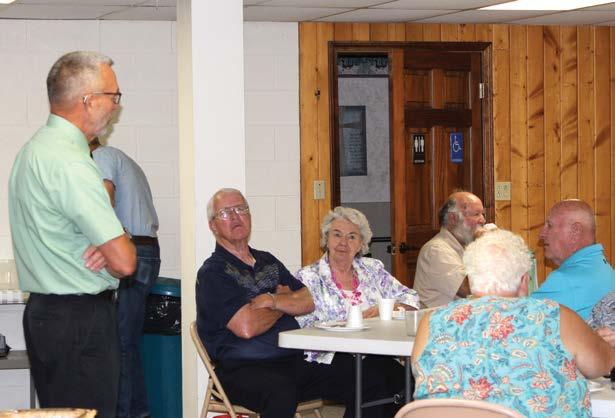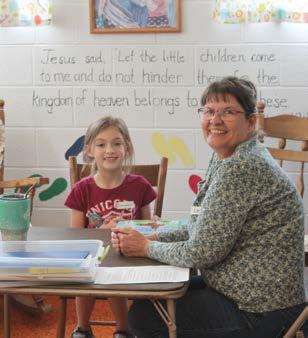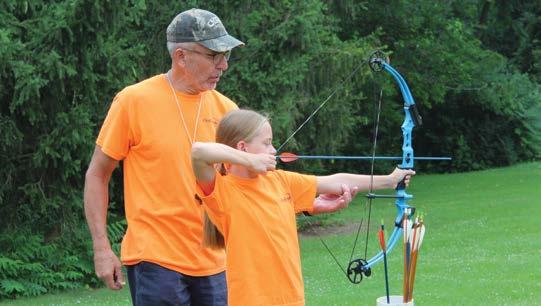
6 minute read
Ministry Happens when the Pastor Gets Grilled
with Pastor Steve Whetstone
It's probably true that many pastors enjoy preaching in front of their congregations, whether they’d admit it or not. And it’s also probably true that those same pastors wouldn’t willingly let themselves be grilled with hard questions about their sermon. Yet, that’s precisely what Pastor Steve Whetstone from Zanesville Church of God does every Sunday. Directly after the worship service, about half of Zanesville’s congregation gathers for a meal made by volunteers and a time of Q/A that they call “Grill the Pastor.” Yes, it’s a little tongue in cheek, but that speaks to the lighthearted nature of the event. Sometimes they literally eat food from a grill while they “grill” the pastor with theological, pastoral, and hermeneutical questions, but it’s rarely heated or intense.
I asked Pastor Steve why he was willing to subject himself to every public speaker’s worst nightmare; the potential of being pelted with food in response to a poor performance. Pastor Steve said that it’s really about “giving people the opportunity to ask questions about what they heard, and how the Holy Spirit was speaking to them.” The initial idea came from Pastor Travis Bodden who often hears churches complain that “people only come if we provide food,” to which he is known to respond, “Well, why don’t you have food?” And so, Zanesville started having food.
Zanesville used to have Sunday school before every service, but the attendance was starting to wane. Once the church came back from Covid, they replaced Sunday school with Grill the Pastor, and they’ve seen the attendance to this ministry nearly double. Not only that, but the back-and-forth interaction has provided Pastor Steve with a way to hear where his congregation is at spiritually, how they are doing, and what they need. “Before, there was no good way of gauging or measuring engagement with the message,” Pastor Steve said.
“I do now because I hear how they’re answering my questions or the comments they make about what they heard.” Over time, this engagement has allowed Pastor Steve to better understand what his people are struggling with, because the patterns of their responses, the way they answer questions, or the way they respond to the sermon, often says more about themselves than his message. He said, “I’m at a place where I can ask, ‘Why did you hear it that way?’ Those are the questions that are running in my mind. ‘Why are you hearing that?’”
I suspected that a Q/A session after every sermon might change the way Pastor Steve prepares his message. Perhaps he spends more time on them, or double checks his facts, but that’s not the way Pastor Steve talked about it. “I look forward to in-depth questions, to be honest,” he said. “I’m okay with saying, ‘I don’t know,’ and I can always turn it back on them by saying, ‘Where did you find that in the Bible?’ or ‘Why do you feel so strongly about this?’ I don’t feel like I always have to provide the answer.” Based on Pastor Steve’s demeanor and response, it doesn’t sound like he’s aiming for another time of teaching, but rather a time for discussion and introspection. “I just try to facilitate a discussion that’s going to happen with other people anyway.” Being present in their conversations is a way for Pastor Steve to help cultivate and encourage deepening relationships in his church, and that’s his favorite take away from the experience.
This willingness to step out in faith and to try something new isn’t limited to Grill the Pastor. Zanesville Church also hosts two other ministries that target specific needs within their surrounding communities. “Let’s Read It” is a reading program for kids in Kindergarten through 5th grade, where the kids pick out a subject from among the 3,000+ books at the church, and a volunteer reading partner asks questions to help them pay close attention to the text. Likewise, the church also hosts a program called “Centershot,” which is an archery tutoring event, where kids can come out, learn the basics of archery at no cost, and compete with each other while also getting a brief devotional time beforehand.

Both outreach programs came out of a townhall council meeting where three pastors, including Pastor Steve, invited a Sheriff deputy, a school guidance counselor, House of Hope, and a family/ marriage counselor to answer questions, and educate the pastors about their community. Pastor Steve said that, “We had each one give a 30-minute talk about what the church could do in the community for each organization. We discovered it’s a poor part of the county, with a disconnect between parents and schoolwork. In Zanesville, kids don’t have constructive things to do. Both of these programs, Centershot and Let's Read It, came out of the statistics of poverty, reading, and education. That’s why we picked up some of [these ministries].”
In every issue of this “Region by Region” series we’ve been hearing about pastors who come to new ministry because they come to know their communities better. It sounds obvious, but it can be a real challenge. Somewhat paradoxically, reaching past the church walls is especially difficult if things are going well on the inside and that’s a sentiment Pastor Steve echoed. “When things weren’t going well... it gave us time and a desire to get out in the community and look at that stuff, to try and figure out what we need to do.” We’ve heard this idea

before in 2022 at the CGGC Triennial Conference from the keynote speaker, Brad Brisco. While speaking about ‘post Christendom,’ Brad said, “Instead of operating from a place of privilege and power, we once again have to operate in the posture of a servant. Another way to say that is, we actually have to follow the way of Jesus.” The implication being that, while we’ve been preaching the message of Jesus for the last 2,000 years, we haven’t always been doing it in the way of Jesus.
Centershot, Grill the Pastor, and Let’s Read It, all came about because of a humble recognition that although Pastor Steve knew the right answer was always Christ, he didn’t always know the question, or who was asking. Whether it was allowing his own congregation to have a voice, or listening to key community members, hearing the issues that face the community, and serving them is a fundamentally mission-minded way of doing ministry. This is the posture that the church needs to continue to live into if we want to follow the way of Jesus.





